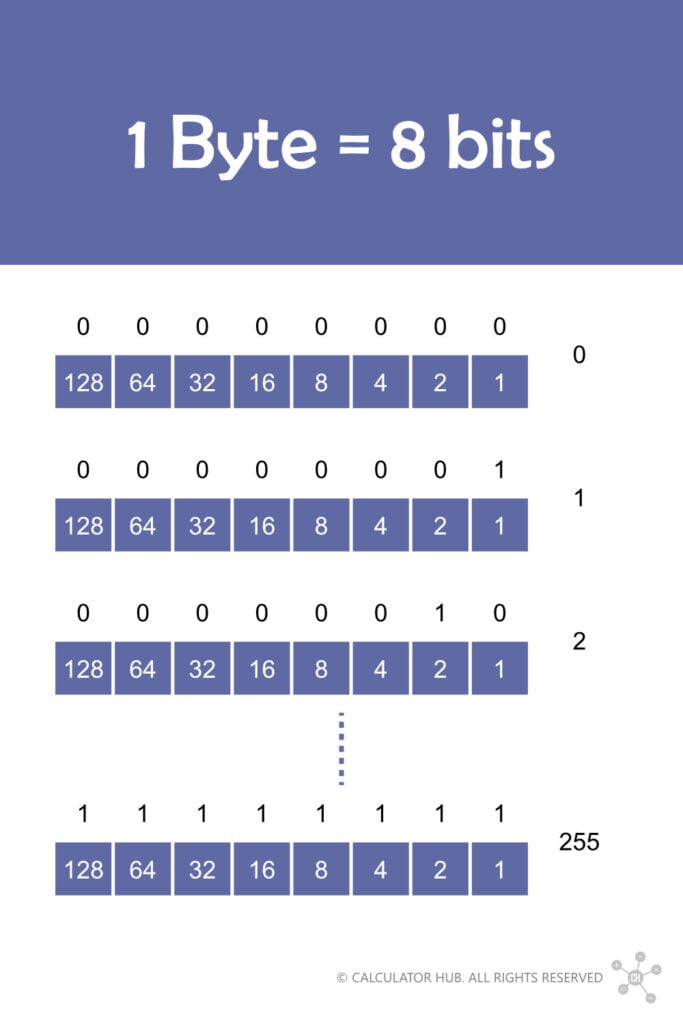In this article, we’ll show you how to convert data transfer rates from megabits per second (Mbps) to megabytes per second (MB/s or MBps). We will cover essential definitions, provide examples, share relevant formulas, and present tables, along with answers to common questions.
Definitions of Mbps, MB/s, and MiB/s
Let’s get started by understanding the key definitions and differences between Mbps, MBps, and MiBps. Understanding these terms will allow you to perform conversions confidently.
What is Megabit per second (Mbps)?
A MegaBit per second (Mbps) is a unit of measurement for data transfer rates. It is part of the International System of Units (SI)[1] and uses decimal multiples of bits (106). It has symbols or abbreviations such as Mbps, Mb/s, Mbit/s, or Megabit/s. One megabit per second equals 1,000,000 bits or 0.125 MB/s.
What is Megabyte per second (MB/s)?
A MegaByte per second (MB/s) is a unit of measurement for data transfer rates. It is part of the International System of Units (SI) and uses decimal multiples of bytes (106). It has symbols or abbreviations such as MBps, MB/s, Mbyte/s, or Megabyte/s. One megabyte per second equals 8,000,000 bits or 8 Mbps.

What is Mebibyte per second (MiB/s)?
A MeBiByte per second (MiB/s) is a unit of measurement for data transfer rates. It is part of the International Electrotechnical Commision (IEC)[2] and uses binary multiples of bytes (220). It has symbols or abbreviations such as MiBps, MiB/s, Mibyte/s, or Mebibyte/s. One mebibyte per second equals 8,388,600 bps, 8.3886 Mbps, or 1.0486 MB/s.
MB/s vs. MiB/s
The main difference between megabytes per second (MB/s) and mebibytes per second (MiB/s) is that MB/s measures the amount of data transferred over a network or the internet every second. On the other hand, MiB/s measures the amount of data being read every second from a storage medium, such as computer memory, cache, or hard drive.
Example: How long does 1 Mbps transfer rate take to download a 10MB file?
In this case, a 10MB refers to a file size which stored on a server hard drive. So, the 10MB actual data size is equivalent to:
10 MiB - Mebibytes10.486 MB - Megabytes83.886 Mb - Megabits
Therefore, it would take 83.886 seconds to download a 10 MB file with a 1 Mbps transfer rate.
How to convert from Mbps to MB/s?
To convert a data transfer rate from megabits per second (Mbps) to megabytes per second (MBps), follow the simple steps below:
- Write down the rate value in
megabits per second (Mbps). - Multiply it by the value of a
Mbps-to-MBpsconversion factor:0.125. - The result from multiplication is the value of the transfer rate in
megabytes per second (MB/s).
Mbps to MB/s formula
Let’s take a closer look at the conversion formula so you can carry out these conversions independently, whether you're using a calculator or doing it manually with pencil and paper.
Fraction formula for converting from Mbps to MB/s: n MB/s = n Mbps ÷ 8
Decimal formula: MB/s = Mbps × 0.125
Or remember the Mbps-to-MBps conversion factor: 1 Mbps = 0.125 MB/s
Examples
Now, let's take a look at an example that illustrates the calculations required to convert from megabits to megabytes per second (Mbps to MB/s).
Convert 20 Mbps to MB/s?
Write down 20 Mbps and multiply it by the Mbps-to-MBps conversion factor: 0.125 to get MB/s:
So, 20 megabits per second is equal to 2.5 megabytes per second.
Alternatively, you can use our calculator by entering 20 into the Mbps box, and you instantly get the rate in MBps, in this case, 2.5 MBps or 2.5 MB/s.

You can toggle any or all data transfer rate units to perform real-time calculations for all selected units including mebibytes per second (MiBps or MiB/s).
Mbps to MB/s conversion table
Here is a conversion table from Mb/s (Mbps) to MB/s (MBps) valued from 0.1 to 1,000. Use the table below for a quick reference or remember it for everyday use.
| Megabits per second | Megabytes per second |
|---|---|
| 0.1 Mbps | 0.0125 MB/s |
| 0.5 Mbps | 0.0625 MB/s |
| 1 Mbps | 0.125 MB/s |
| 2 Mbps | 0.25 MB/s |
| 4 Mbps | 0.5 MB/s |
| 5 Mbps | 0.625 MB/s |
| 10 Mbps | 1.25 MB/s |
| 20 Mbps | 2.5 MB/s |
| 30 Mbps | 3.75 MB/s |
| 40 Mbps | 5 MB/s |
| 50 Mbps | 6.25 MB/s |
| 60 Mbps | 7.5 MBps |
| 70 Mbps | 8.75 MB/s |
| 80 Mbps | 10 MB/s |
| 90 Mbps | 11.25 MB/s |
| 100 Mbps | 12.5 MB/s |
| 200 Mbps | 25 MB/s |
| 500 Mbps | 62.5 MB/s |
| 800 Mbps | 100 MB/s |
| 1000 Mbps | 125 MB/s |
FAQs
How many Mbps are there in a MB/s?
Based on the definitions of megabit and megabyte, 8 megabits per second (Mbps) is equivalent to 1 megabyte per second (MBps) or 1 MB/s equals 0.125 Mbps. When expressed using powers of ten, which is the norm in the decimal system, 1 megabyte corresponds to 106 bytes, while 1 megabit corresponds to 106 bits.
Is 1 Mbps or 1 MB/s faster?
A megabyte per second (MB/s) is eight times faster or bigger than a megbits per second (Mbps). A bit is the base unit of data storage in the International Electrotechnical Commission (IEC), while a Mbps equals 1×106 bit/s and a KBps equals 1×106 byte/s.
You now know how to convert data transfer rate from megabits per second (Mbps) to Megabytes per second (MB/s). You can quickly use our calculator to convert between the any data transfer rate units to save time for future calculations.
For further understanding, check our data storage converter page to learn more about the differences between decimal and binary units of data storage.

